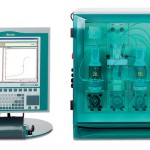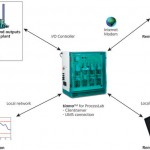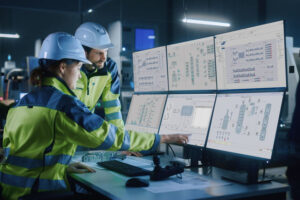In recent years analytical measurements have been increasingly transferred from the laboratory to the plant. This places high demands on the analytical systems. They must be robust in order to function in the harsh plant environment and optimally adapted to the particular process; they must also have interfaces for rapid internal and external communication via Ethernet, input/output lines, LIMS and databases.
Frank Portala, Nils Geil, Alfred Steinbach
In view of the increasing competition, production units must be operated as economically as possible. This means that products must be manufactured at high throughputs, with a high yield and at an affordable price while ensuring that the specified quality is maintained. In this context, monitoring of the relevant process parameters is of utmost importance. Particularly for high analysis frequencies, online and inline analysis systems directly linked to the process are ideal. However, if several sampling points need to be monitored or a variety of parameters analysed, or if the analysis cycles are longer, then atline analysis systems are an attractive alternative, not least for cost reasons. In an atline system, the sample is taken manually and analysed directly at the process line (on-site). In this way, different samples from different process stages or units can be quickly processed.
Conventional laboratory systems are also frequently used as atline systems, however, although they are neither built for rough plant conditions nor capable of exchanging information with the process environment. Moreover, most of these systems do not have a modular design and as a result cannot be optimally adapted to the process or to any future requirements.
Robust and easy to use
The ProcessLab system presented here is a robust, easy-to-use atline analysis system that meets the requirements for routine analyses in plant surroundings. The system is contained in a dust- and splash-proof housing and, because of its modular design, can easily be adapted to meet the specific analytical and technical requirements. Each instrument consists of an operating unit and an analysis module with the wet chemistry and electronics parts hermetic-ally separated from each other. All analysis methods and results are centrally recorded, administered in a common database and available for monitoring as well as for direct control. Data can be exported via Ethernet to any LIMS, made available to a process control system or be used on the corporate intranet. The digital and analogue input/output (I/O) components allow the system to be easily incorporated in the process surroundings. In this way, it can react to different input signals, for example by automatically measuring different parameters depending on the sample, triggering an alarm if limits are infringed or transferring results as analogue 4 to 20 mA signals. With the Ethernet connection (RJ45), ProcessLab can be integrated into a local network or fully operated by remote control. The system is controlled by the tiamo software, which is installed on an integrated industrial PC. The operating unit with built-in TFT monitor, touch-sensitive keyboard and touchpad ensures easy and convenient operation. Alternatively, an operating unit with a touch screen can be selected for even simpler handling. Modern interfaces such as Ethernet and USB permit the operating unit and analysis modules to be set up at different locations.
The strength of ProcessLab lies in its versatility. The table shows a few typical applications. Depending on the requirements, many analysis and sample preparation techniques can be used:
- Direct measurement of the pH value, redox potential and conductivity
- Measurements with ion-selective electrodes (ISE)
- Potentiometric titration
- Karl Fischer titration (KFT)
- Photometry/spectrometry
- Voltammetry (VA)
- Cyclic voltammetric stripping (CVS)
- Liquid handling for sample preparation
This means that different applications can be carried out in a straightforward way. What’s more, analytical methods developed in the laboratory with tiamo can be easily transferred to ProcessLab. Samples can be fed in manually or, for a larger sample throughput, by a sample changer. In addition to these techniques, third-party equipment can also be integrated for determining temperature, density, pressure, refractive index, viscosity etc. The data is likewise stored in the tiamo database. As a result, the range of measuring methods and parameters is significantly extended.
Modularity means that the various components can be combined to form a complete and efficient system. Depending on the analytical requirements, a custom-built analysis system comprising any number of components is assembled. Although numerous applications can be realised by titration, ProcessLab, by using voltammetry (VA) and cyclic voltammetric stripping analysis (CVS), opens up a further important field of application for process analysis. Whereas voltammetry is preferred for classic trace analyses, CVS enables organic additives to be determined in electroplating baths. The ProcessLab VA/CVS system, with its built-in potentiostat/galvanostat 797 VA Compu-trace, has an extremely simple and compact design. Analysis sequences can be started by pressing a single button; this ensures error-free operation of the system. As a result of the modularity and the numerous communication possibilities, the systems are very versatile.
cpp 452
Atline analysis by Metrohm
Expoquimia 2008
Share:








